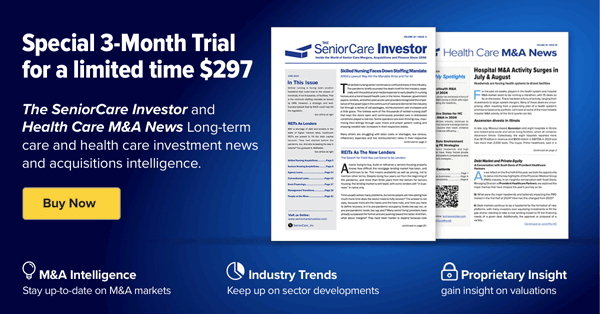The Behavioral Health Care (BHC) sector appeared to be on the up-and-up since breaking records in deal totals in 2021 when there were 124 transactions announced. So far, during 2022, there have been 79 deals announced as of September 30, 2022, falling just short of the 83 deals announced during the same 2021 period. Although, pre-2021, this would be a strong showing for this market, it pales in comparison to the incredible growth we’ve been seeing lately in the BHC sector, which started to slow near the end of the third quarter.
There were 23 BHC deals announced during Q3 of 2022 across nine different subsectors, including substance use, autism & I/DD services, psychiatric/clinical care, inpatient behavioral health hospital, counseling and more. While Q3:22 deal totals are on par with Q3:21, it’s important to note that after some months of exponential growth within the sector, deal announcements came to a screeching halt in September when there were only three BHC deals announced, making up just 3.8% of BHC deals during 2022. In comparison, September 2021 had nine BHC transactions, making up 10.8% of BHC transactions from January to September last year.
The most active BHC subsector during Q3 has been substance use, making up approximately 39% of the 23 BHC deals during the quarter. So far this year, there have been 30 deals targeting substance use disorder providers, making up 35.7% of all 2022 BHC acquisitions. The second most active subsector is counseling, with 12 transactions announced YTD and three announced during the third quarter.
The most active acquirer in the BHC space has been BayMark Health Services, which has made five acquisitions since the start of 2022, all in the substance use subsector. BayMark Health, a portfolio company of private equity firm Webster Equity Partners, provides medication-assisted treatment for opiate addiction and dependency to 70,000+ patients across more than 300 treatment facilities in 35 states and 3 Canadian provinces. BayMark kicked off 2022 by acquiring Kaden Health in January 2022, followed by Mahajan Therapeutics in February; Pathfinders Recovery Center, Emerald Isle Health and Recovery and three residential and outpatient substance use treatment programs in March; and San Antonio Recovery Center in July.
BrightView Health was the most frequent BHC buyer during the third quarter, with two acquisitions. In August, the substance use treatment provider scooped up Column Health, which operates 12 community-based outpatient mental health and addiction clinics throughout Massachusetts and Connecticut. Then, in September, BrightView acquired Corebella Health & Wellness, which specializes in treating attention-deficit hyperactivity disorder, bipolar disorder, pain management and addiction medicine, including alcohol dependence, substance abuse, fentanyl and heroin addiction.
Substance use has been the busiest BHC subsector, with 30 deals announced YTD as of September 30, 2022. The drug epidemic has taken a severe toll on many communities across the country, and COVID-19 only worsened the situation and hindered many people’s access to quality care. Additionally, many people came out of the pandemic with dependencies on new substances and are now seeking treatment. M&A in the substance use subsector has remained steady post-COVID, with nine transactions announced during Q3:22, which matches the nine announced during Q3:21 at the height of the pandemic.
Webster Equity is the most prominent private equity backer of substance use. During 2022, the company has sponsored five substance use acquisitions through its portfolio companies, which include BayMark Health Services and Discovery Behavioral Health.
The largest BHC deal of the year occurred in August when Charlesbank Capital Partners made an $840 million acquisition of Action Behavior Centers, which provides applied behavior analysis (ABA) therapy services for children on the autism spectrum through its numerous clinics across Texas.
Private equity has shown much interest in the BHC sector this year. In fact, according to LevinPro HC data, 46 of the 79 BHC transactions were made by private equity firms or their portfolio companies, making up approximately 58.2% of all 2022 transactions. During the third quarter of 2022, private equity backed ten of 23 transactions, making up approximately 43.5% of deals announced. Although deal totals show a steady drop in private equity interest throughout 2022, there is still lots of private capital to be had, and the market keeps moving despite its uncertainty.
Another significant deal this year, which also involved private equity, was Revelstoke Capital Partners’ purchase of Monte Nido & Affiliates from Levine Leichtman Capital Partners in July. Founded in 1996, Monte Nido & Affiliates specializes in treating eating disorders.
Although there has been a noticeable slump within the BHC sector, with nearly every subsector taking a hit, the third quarter wasn’t a complete dud, with some large price tags getting announced and some prominent PE players carving a place in the industry. Before ringing the warning bell, it is essential to remember that nearly every healthcare sector tracked on LevinPro HC has experienced some decline in recent months as the 2021 and 2022 flurry winds down. Right now, with the uncertainty of the market, it is nearly impossible to predict how the remainder of 2022 will pan out. Still, one thing is clear: the pressing societal need for behavioral healthcare will never go away and will continue to bring interested investors into the fold, slump or no slump.


